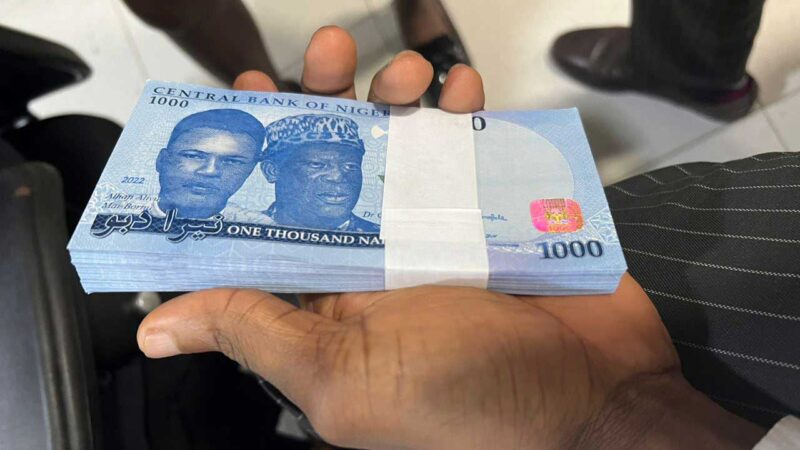News
NNPC records 314% increase in trading surplus

The Nigerian National Petroleum Corporation (NNPC) has announced a N39.85billion trading surplus for the month of February 2021 representing a massive 314.24 per cent leap from the N9.62billion surplus it recorded in January 2021.
This is contained in the February 2021 edition of the NNPC Monthly Financial and Operations Report (MFOR), according to a statement by the Group General Manager, Group Public Affairs Division of the Corporation, Dr. Kennie Obateru.
Trading surplus or trading deficit is derived after deduction of the expenditure profile from the revenue for the period under review.
According to the report, in February 2021, NNPC Group operating revenue as compared to January 2021, increased by 35.64per cent or N152.07billion to stand at N578.79billion.
Similarly, expenditure for the month increased by 29.21 per cent or N121.83billion to stand at N538.94billion. The expenditure for the month as a proportion of revenue was 0.93per cent as against 0.98per cent the previous month.
The significant increase in trading surplus is attributed mainly to reconciled accounts by the Corporation’s downstream subsidiary, the Petroleum Products Marketing Company (PPMC), using the Petroleum Products Pricing Regulatory Agency (PPPRA) pricing template.
Other factors that boosted the trading surplus figure, according to the Corporation, included the performance of Duke Oil, Nigerian Gas Company (NGC) and Nigerian Gas Marketing Company (NGMC) which recorded robust gains as a result of increased debt collection and cost optimization measures.
Conversely, during the period under review, 54 pipeline points were vandalized representing 50% increase from the 27 points recorded in January 2021.
The Warri Area accounted for 50per cent and Mosimi Area accounted for 39per cent of the vandalised points while Kaduna and Port Harcourt Areas accounted for seven per cent and four per cent respectively.
NNPC continues to work in collaboration with the local communities and other stakeholders to eliminate the menace of pipeline vandalism.
In the period under review, the Corporation supplied a total of 1.41bn litres of Premium Motor Spirit (petrol) translating to 50.52m litres/day.
In terms of natural gas offtake, commercialization and utilisation, out of the 206.05billion cubic feet (BCF) produced in February 2021, a total of 133.06BCF was commercialized consisting of 40.15 BCF and 92.91 BCF for the domestic and export market respectively.
This translates to a total supply of 1,433.75Million Standard Cubic Feet Per Day (mmscfd) of gas to the domestic market and 3,318.25mmscfd of gas supplied to the export market for the month.
This implies that 64.48per cent of the average daily gas produced was commercialized while the balance of 35.52 per cent was re-injected, used as upstream fuel gas or flared.
Gas flare rate was 7.67per cent for the month under review (i.e. 565.52mmscfd) compared with average gas flare rate of 7.12per cent (i.e. 529.20mmscfd) for the period of February 2020 to February 2021.
The February 2021 NNPC Monthly Financial and Operations Report is the 67th in the series. It is published in keeping with the Corporation’s commitment to transparency and accountability.
News
Currency in circulation now N4.8tn – CBN report

Currency in circulation now N4.8tn – CBN report
Currency in circulation has reached an all-time high of N4.8 trillion as of November 2024, recording over seven per cent increase from the previous month.
Also, currency outside banks grew significantly in the same month hitting an all-time high of N4.6 trillion from the N4.2 trillion in the month of October.
These figures were contained in the money and credit supply data from the Central Bank of Nigeria (CBN).
The currency in circulation is the amount of cash–in the form of paper notes or coins–within a country that is physically used to conduct transactions between consumers and businesses.
It represents the money that has been issued by the country’s monetary authority, minus cash that has been removed from the system.
Similarly, currency outside a bank refers to cash held by individuals, businesses and other entities that is not stored in banks.
The currency outside the bank represents about 96 per cent of the currency in circulation.
Nigerians have in recent times been facing acute cash shortage with banks limiting daily withdrawal at Automated Teller Machines (ATMs) to N20,000 irrespective of the number of accounts held by an account owner.
READ ALSO:
- Cross River man kills mother, dumps body inside well
- El-Rufai mocks Reno Omokri with throwback protest photos against Tinubu
- Warri refinery: Marketers hopeful of further petrol price drop
According to the latest data, the currency in circulation grew by seven per cent to reach 4,878,125.22 from 4,549,217.51 in October.
Currency in circulation has grown steadily in the outgoing year 2024 with over one trillion naira added to cash in circulation after starting the year with N3.65 trillion in January.
In February, the currency in circulation slightly increased to N3.69 trillion representing an increase of N43 billion or 1.18 per cent from the January figure.
March also saw an appreciable increase to N3.87 trillion while it further increased to N3.92 trillion in the following month of April.
The growth trajectory continued in May with the currency in circulation increasing slightly to N3.97 trillion, an increase of N42 billion or 1.07 per cent while it reached an all-time high of 4.04 trillion, an increase of 2.11 per cent from May.
The July figure also rose marginally with the currency in circulation settling for N4.05 trillion before growing to N4.14 trillion in August and N4.43 trillion in September and N4.5 trillion in October.
In the same vein, currency outside banks grew from N4.2 trillion in October to N4.6 trillion in November, showing increasing preference for other means of storing outside bank deposits.
Economist, Dr. Paul Alaje attributed the development to the expanding money supply, adding, “Money supply is expanding but this may not necessarily be in cash. As it is expanding, it will necessarily induce inflation. But you can’t blame the people. People must look for money. How much was bottled water last year, how much is it today? All of this will induce inflation. If you now ask, what is the cause of inflation? Is it money supply itself or a devaluation policy? It is a devaluation policy. Money supply is an offshoot. So the Central Bank is raising interest rates to actually reduce money supply but the more they try the more money supply expands.”
He stated that the floatation policy of the CBN has created inflation, adding, “It is like chasing one’s tail and I don’t know if you are going to catch it.”
Currency in circulation now N4.8tn – CBN report
News
Tinubu not telling Nigerians the truth, says Sule Lamido

Tinubu not telling Nigerians the truth, says Sule Lamido
President Bola Tinubu has been accused of not being forthright about the true state of Nigeria under his administration.
Former Jigawa State Governor and senior Peoples Democratic Party (PDP) member, Sule Lamido, made the accusation while speaking on the BBC Hausa programme Gane Mini Hanya.
Lamido criticized both Tinubu and former President Muhammadu Buhari for what he described as a lack of transparency in governance.
“Buhari’s and Tinubu’s governments are not being transparent with Nigerians unlike during the time when PDP was in power where everything was transparent and open to all Nigerians,” Lamido said.
READ ALSO:
- Odili: Fubara prevented Wike from turning Rivers to private estate
- Putin apologises over Azerbaijan plane crash reportedly shot down
- 256 terrorists, two logistics suppliers arrested in one week – DHQ
He accused the two administrations of relying on propaganda rather than providing citizens with accurate information.
Lamido also expressed concerns over President Tinubu’s recent loan requests, questioning the logic behind them. “If Nigerians are being told the truth then there is nothing wrong with that, but how would you budget N30tn, generate N50tn and then request loan when you have a surplus of N20tn,” he said, referencing last year’s budget.
He described the situation as “reckless” and “selfish,” adding, “This recklessness and clear-cut selfishness is not done anywhere in the world, but yet you find (some) Nigerians supporting it. Visit social media and see how APC is being criticised, being referred to as calamity, yet you find some protecting it.”
Tinubu not telling Nigerians the truth, says Sule Lamido
News
Nigeria Customs Service begins 2025 recruitment [How to apply]

Nigeria Customs Service begins 2025 recruitment [How to apply]
The Nigeria Customs Service (NCS) has announced the commencement of its recruitment exercise, assuring Nigerians that the process is entirely free and fair.
The agency has cautioned the public to be vigilant against scammers who may attempt to exploit unsuspecting applicants during the recruitment period.
Applications are invited for positions in the Superintendent, Inspector, and Customs Assistant cadres as part of the Service’s plan to recruit 3,927 officers in 2025.
This initiative is aimed at enhancing trade facilitation and supporting Nigeria’s economic recovery efforts.
“Our recruitment is entirely free and fair. At no stage do we charge fees. Anyone requesting payment is a scammer,” the agency emphasized, urging applicants to be wary of fraudulent schemes.
READ ALSO:
- Dangote, Tinubu, Lookman, Badenoch named among 100 most influential Africans in 2024
- Heavy security in Ilesa as ex-Osun deputy gov emerges new Owa-Obokun
- Hacker has stolen N180m from my NGO account – VeryDarkMan cries out
The NCS outlined eligibility criteria, stating that applicants must be Nigerian citizens by birth, possess a valid National Identification Number (NIN), and have no criminal record or ongoing investigations.
Academic qualifications for the three cadres are as follows:
Superintendent Cadre: A university degree or Higher National Diploma (HND) along with an NYSC discharge or exemption certificate.
Inspectorate Cadre: A National Diploma (ND) or Nigeria Certificate in Education (NCE) from an accredited institution.
Customs Assistant Cadre: At least an O’Level certificate (WAEC or NECO).
In addition to these qualifications, the NCS stressed that all applicants must be physically and mentally fit, providing evidence of medical fitness from a recognized government hospital.
Nigeria Customs Service begins 2025 recruitment [How to apply]
-

 Politics3 days ago
Politics3 days agoGbajabiamila speaks on his rumoured Lagos governorship ambition
-

 metro2 days ago
metro2 days agoFarotimi to pursue disbarment over arrest, defamation allegations
-

 Business2 days ago
Business2 days agoReal reason Dangote, NNPC drop petrol price — IPMAN
-

 Health2 days ago
Health2 days agoABU Teaching Hospital will begin kidney transplant in 2025 – CMD
-

 Sports20 hours ago
Sports20 hours agoAnthony Joshua prostrates before Governor Abiodun during Ogun visit
-

 International3 days ago
International3 days agoBREAKING: Plane skids off runway in South Korea, killing at least 120
-

 metro3 days ago
metro3 days agoEl-Rufai accuses Tinubu govt of Yoruba agenda, Reno Omokri reacts
-

 metro2 days ago
metro2 days agoNigerian govt urged to intervene in Mozambique post-election violence

